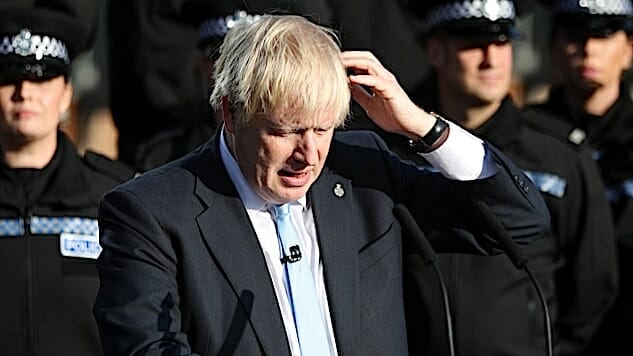The Brexit Mess, Explained for Confused Americans
Photo courtesy of Getty
I’m hearing a lot of news from the United Kingdom. What’s happening over there? Can you give it to me in a few sentences?
The British Prime Minister, Boris Johnson, wants the UK to leave the European Union by Halloween, with or without a deal. Most of Parliament disagrees with him. He’s tried to use strong-arm tactics, and it hasn’t gone over well. The Johnson government is falling apart. The Prime Minister’s own brother just quit the House of Commons in protest, and Winston Churchill’s grandson was just expelled from the Conservative Party. Eventually there will be a general election, and that will likely decide the fate of the UK in Europe.
Who is Boris Johnson?
Johnson, the current Prime Minister of the United Kingdom, is a Tory (Conservative) politician famous for three things. First, his hair. Second, he’s one of the leaders of the Brexit movement. Third, he’s widely considered to be a Trump-style politician: blustering and ham-handed.
The previous Tory Prime Minister, Theresa May, failed to direct the country through the Leave Process. She resigned. The Tories picked Johnson as her replacement. Boris’ hard-line and unapologetic style, which worked so well for him as a pundit, journalist, and rabble-rouser, has been absolutely disastrous for him as a Prime Minister and shepherd of Brexit. As the title of one Eliza Mackintosh article stated, “No one thought a UK Prime Minister could be worse than Theresa May. Until now.”
Wait, what is Brexit? Can you expand on that?
The United Kingdom is in the process of leaving the European Union. This has been incredibly difficult in every way—politically, economically, culturally. Since the successful 2016 Brexit referendum, every British government has tried to draft laws arranging the specifics of Brexit, but all of these laws have been voted down.
Getting Parliamentary consensus on the issue has been nearly impossible. Earlier this year, the House of Commons passed an act stating that Exit Day was to be at 11 PM on October 31, 2019. Hence the deadline.
Most dispassionate observers think Johnson is probably the worst person to handle the crisis, and that’s exactly the way he’s handling it.
What do you mean? What’s difficult about Brexit?
What isn’t difficult about Brexit? Begin at the beginning. In 2016, which will be referred to by future historians as the year of “What Happened, Man?” the British voted on a general referendum: should the UK leave or remain in the EU? On June 23, “Leave” passed with 51.9 percent. This was incredibly surprising, since the Cameron government, which asked for the vote, didn’t think people would actually vote to Leave.
There were a couple of problems with the vote, but the big one is that the vote was only an intention to leave. The how and why were left wide open.
In brief, the 2016 referendum had no legal force; it didn’t specify how to Brexit; it didn’t provide guidelines; there were massive irregularities, fake news, and overspending by the pro-Brexit side.
Additionally, the vote was cut along generational lines. Millions of people may have been misled. There are troubling associations of xenophobia tied to Leave. There is polling data which suggests the majority of British people now want to Remain.
What is the overall status of the Brexit project in 2019?
What you now have is a divided public voting on a half-conceived plan on which most of the leading officials of the country probably don’t want to follow through. Britain has been part of the EU in one form or another since 1973.
Joining that transnational organization has been the slow, accretionary work of generations, and removing the country from the EU would be a project requiring planning, strategic oversight, a fine grasp of details, a united public, and careful leadership.
That is not what the UK has right now.
What exactly has Johnson’s government done wrong?
Where to begin? The simple blow-by-blow is as follows:
– Johnson tries to push through hard-Brexit legislation in Parliament. That doesn’t work.
– Johnson decides to suspend Parliament from mid-September. It’s within the PM’s power to do this, but it looks suspicious, and anti-democratic.
– After a rebellion in the Commons, the Johnson government began to punish their own members. Johnson fired 21 members of his own party who voted against him—twelve of them are party grandees. Several members changed parties or resigned in disgust. As a result, Johnson lost his majority, and can no longer govern reliably.
– To strengthen his position, Johnson has asked for a general election. But Corbyn and the anti-Johnson coalition have no reason to grant his proposal.
Johnson’s missteps have essentially shifted leadership from the Prime Ministership to the House of Commons. As one commenter said, Johnson is basically under house arrest right now.
Can you go into more detail?
Here’s how the Times describes it:
Determined to deliver Brexit on Oct. 31 “come what may,” Mr. Johnson has become increasingly ruthless, exacerbating existing frictions within his party over Britain’s exit from the European Union. Since taking office in July, Mr. Johnson has purged cabinet ministers and ordered a five-week suspension of parliament as a tactic to limit its ability to challenge his plan to leave the European bloc with or without a deal.
Johnson started strong, He said that Brexit would go through, regardless. As CNN noted, “How quickly it all went wrong.”
Johnson has lost every one of his first votes in parliament, an unprecedented record in the modern era. Undeterred, the Prime Minister purged 21 members of his parliamentary party who voted against him, blowing apart his majority. Then, his efforts to secure a snap general election — with the goal of replacing the sacked lawmakers with a new slate of candidates more aligned with his hard-Brexit views — were scuppered when opposition Labour leader Jeremy Corbyn refused to play along.
The suspension of Parliament was the starting gun. On a strategic level, a shorter Parliament means less time to discuss and vote on Brexit, and possibly oppose Brexit. Most observers agree that this is probably what Boris was going for. This united everyone in Parliament against the Johnson government.
The British don’t have a written constitution the way Americans do. There’s a reason for that. The government is run according to tradition and norms. Suspending Parliament flies in the face of these unspoken but omnipresent rules. If Parliament is shut down in September, it’ll be the longest vacation since the Second World War.
What all of this amounts to is pretty simple: Johnson and his shadowy adviser, Dominic Cummings, tried to get in a staring contest with Europe and with the Brexit opposition. They bluffed, and they’ve gotten called. They thought they could get Brexit through sheer force, and they badly miscalculated.
Johnson’s mistakes caused the formation of an alliance opposed to a No-Deal Brexit. This coalition is comprised of Opposition Parties, and Tory Rebels. The anti-Boris forces have dug in since Wednesday, and without a majority, popular mandate, or many allies, Johnson’s in a fix. He’s got fifty-five days left and Brexit doesn’t seem likely under these conditions.
Why are people hung up on no-deal, hard Brexit. What does that mean?
Leaving the EU is like a really, really, complicated divorce. You can’t just walk out, as much as one of the partners might want to. A succession of Tory governments have said that Brexit will happen according to the Conservative timetable, but this just isn’t so. There is absolutely no reason for the EU to give the UK a deal, if the UK plays hardball. Would you?
The British need Europe more than Europe needs Britain. Any weakness on the part of Europe will make Leaving look attractive to other members, and that’s not what Europe wants. So the process will be as agonizing as possible.
Even if Europe wanted Britain to leave, there are massive lists of rules and regulations and border disputes to be worked out, and these cannot be hashed out in a month. To give a short list of obstacles: rules concerning the movement of capital. The traffic of goods, including food. The movement of EU citizens, including immigrants. The border with Ireland. Huge numbers of subsidies which will have be removed. Pick any part of British modern life, and Brexit will shred it.
What’s the solution?
The immediate consequence is that there’ll be an election. Nobody knows who will win it, but it’s probably Labour’s time to win. If that happens, there will likely be a Second Referendum.
In fact, even if the Labour Party or a coalition of groups doesn’t set up a government, there will almost certainly be a Second Referendum.
If Britain really wanted to leave the EU, they would need to negotiate a decision that a consensus majority of the country could agree upon. That hasn’t happened yet, and will not happen within the time allowed.
Brexit is a very generic idea, and translating generic ideas into policy takes time, attention, and sustained effort. There seems to be real fear among the current Brexit leadership that they would lose a Second Referendum, and that’s one of the reasons they’re hurrying the timetable. The British House of Commons is the Mother of Parliaments. What’s being born there is anyone’s guess.







































